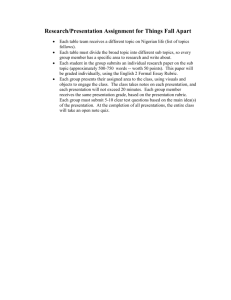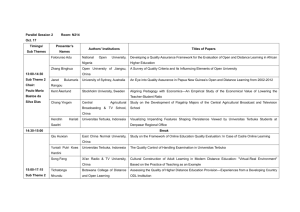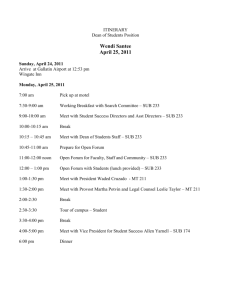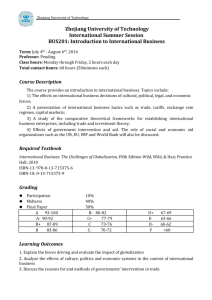Parallel Session 9
advertisement
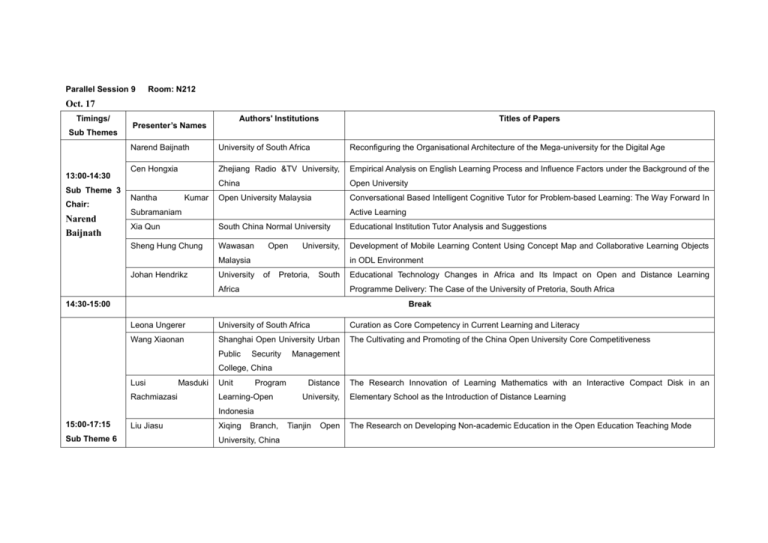
Parallel Session 9 Room: N212 Oct. 17 Timings/ Sub Themes 13:00-14:30 Narend Baijnath Titles of Papers Narend Baijnath University of South Africa Reconfiguring the Organisational Architecture of the Mega-university for the Digital Age Cen Hongxia Zhejiang Radio &TV University, Empirical Analysis on English Learning Process and Influence Factors under the Background of the China Open University Open University Malaysia Conversational Based Intelligent Cognitive Tutor for Problem-based Learning: The Way Forward In Sub Theme 3 Chair: Authors' Institutions Presenter’s Names Nantha Kumar Subramaniam Active Learning Xia Qun South China Normal University Educational Institution Tutor Analysis and Suggestions Sheng Hung Chung Wawasan Development of Mobile Learning Content Using Concept Map and Collaborative Learning Objects Open University, Malaysia Johan Hendrikz in ODL Environment University of Pretoria, South Africa Educational Technology Changes in Africa and Its Impact on Open and Distance Learning Programme Delivery: The Case of the University of Pretoria, South Africa 14:30-15:00 Break Leona Ungerer University of South Africa Curation as Core Competency in Current Learning and Literacy Wang Xiaonan Shanghai Open University Urban The Cultivating and Promoting of the China Open University Core Competitiveness Public Security Management College, China Lusi Rachmiazasi Masduki Unit Program Learning-Open Distance University, The Research Innovation of Learning Mathematics with an Interactive Compact Disk in an Elementary School as the Introduction of Distance Learning Indonesia 15:00-17:15 Sub Theme 6 Liu Jiasu Xiqing Branch, University, China Tianjin Open The Research on Developing Non-academic Education in the Open Education Teaching Mode Chair: Antoinette van der Stellenbosch University, South Writing a Chapter in the New South African Educational Story: Measuring the Impact of the Narend Baijnath Merwe Africa Telematic Support Intervention in Schools Hui Zhu University of Warwick, United Constructivist Computing—A New Paradigm for Open and Distance Learning? Kingdom Wang Zhijun Elsa Wen-Ying Hsu Ace Rachman Beijing Normal University, China / A Conceptual Framework on Cognitive Engagement for Connectivist Learning: Interaction Principle Athabasca University, Canada Based Connectivism Open University of Kaohsiung, Building an Open Education System for a Diverse Immigrant Society: Concept, Framework, and Taiwan Strategy Universitas Terbuka, Indonesia Marketing Strategy of Universitas Terbuka Oct. 18 Timings/ Sub Themes Presenter’s Names Danny S N Wong Sub Theme 2 Janine Lim Chair: S Open University of Hong Kong, Titles of Papers Learner Engagement and Motivation: A Study of Distance Learning Students in Hong Kong China 9:15- 10:30 Danny Authors' Institutions N Wu Huayi Andrews University, United An Investigation of the Relationship Between Student Activity Patterns and Successful Course States Completion in Self-Paced Distance Courses Yunnan Open University, China Study on Practical Teaching Quality Guarantee and Monitoring System of Open Universities Based Wong on Higher Vocational Education Fu Huashi Hangzhou Radio & TV University, Theoretical and Practical Research on Training Distance Education Students’ Ability of Graphic China Expression 10:30-11:00 Break Lin Liqin Xiamen Radio & TV University, China Analysis on the Personalized Teaching Mode of Open Education Joane Serrano 11:00-12:15 Danny Wong Ding Lihua S of the Philippines Enhancing Quality in Online Class Collaboration Through Peer Evaluation Open University Sub Theme 2 Chair: University N Zhejiang Radio & TV University, Research on the Professional Ethics Education and Talents Training of Accounting Specialty China Sharker Md Numan Bangladesh Open University Student Enrolment Trend at Bangladesh Open University and Its Projection: Challenges and Measures Ju Xianghong Zhejiang University / Zhejiang The Analysis of Influencing Factors about Migrant Workers’ Willingness to Participating in Radio & TV University, China Continuing Education Based on the Verification of Logistic Regression Model


